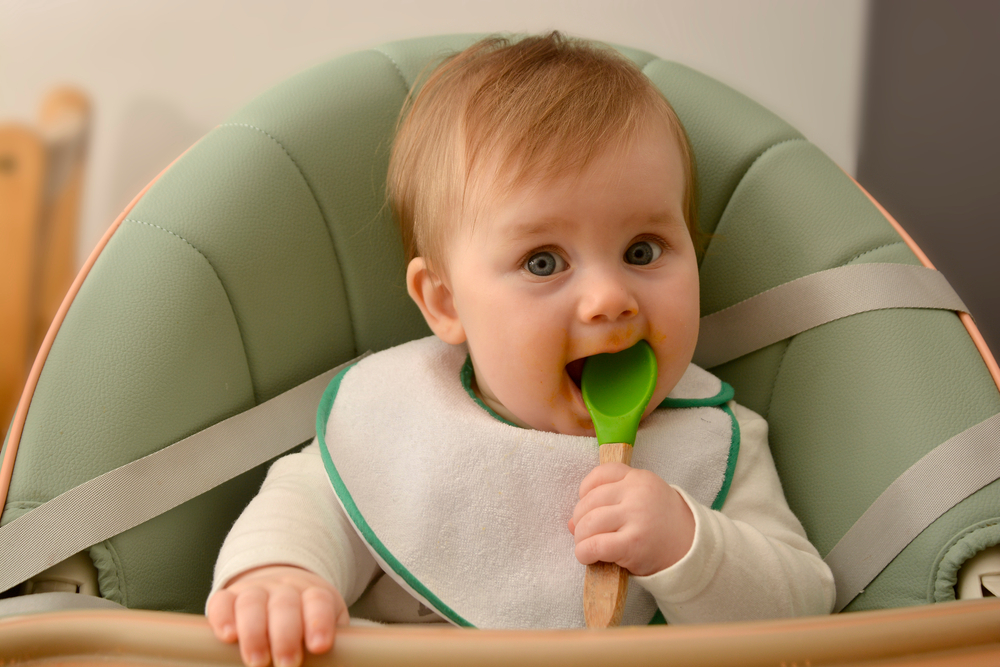When Do Babies Start Talking? Key Milestones, Tips, and Expert Advice for Parents
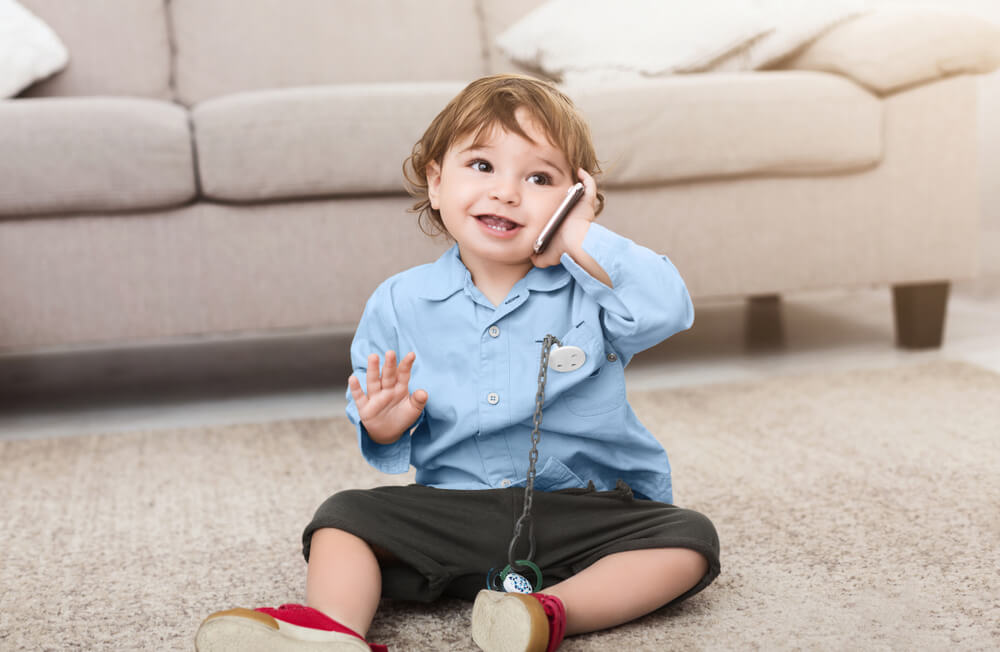
One of the joys of a new baby is watching them grow and develop. Listening to them babble and make familiar sounds is music to the ears of a new parent. But it makes them wonder, when do babies start talking?
Contents:
- At What Age Do Babies Start Talking?
- What Factors Affect Your Baby’s Ability to Talk?
- How to Teach Your Baby to Talk
- Signs and Causes of a Speech Delay
- FAQs
At What Age Do Babies Start Talking?
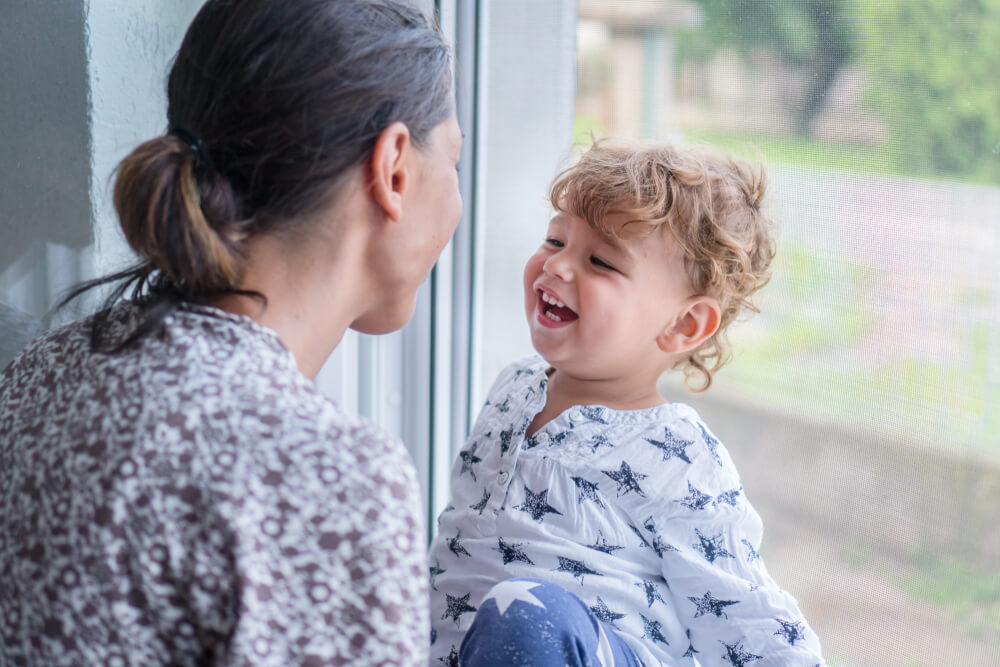
Tavor Photo/Shutterstock.com
Babies begin their journey into the world of spoken language at different stages. Typically, you’ll notice that around 12 to 17 months your baby might be saying 2 to 3 simple words and will try to imitate sounds they hear.
By the time they reach 18 to 23 months, their vocabulary can expand to around 50 words, and they’ll start combining words into short phrases.
Each child’s timing can vary, so it’s important to encourage and support their speech development through constant, loving interaction.
When Do Babies Start Babbling?
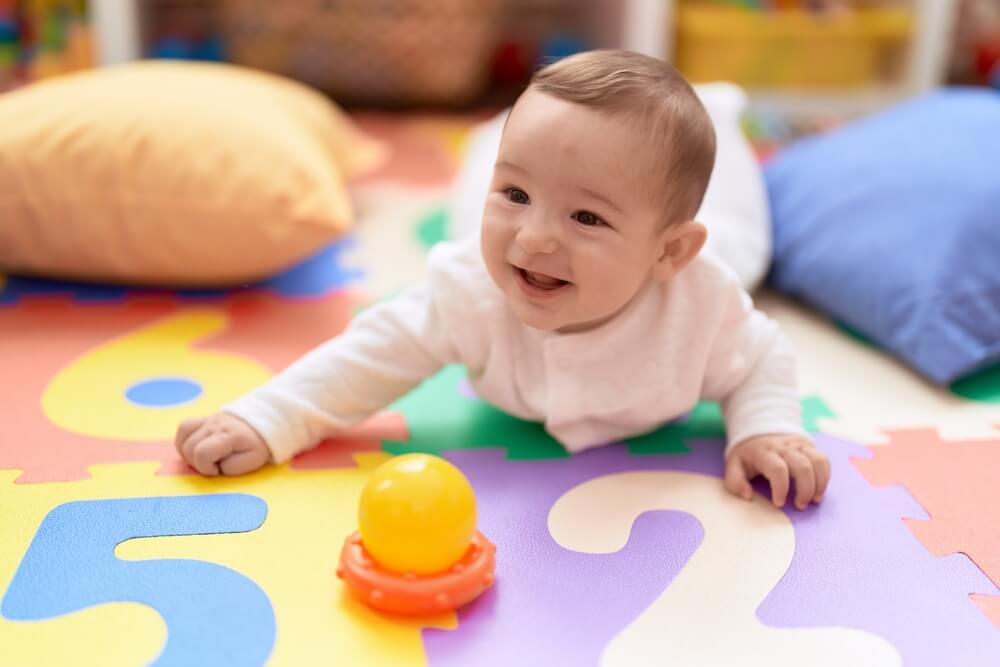
Krakenimages.com/Shutterstock.com
Babies usually start babbling around 4 to 6 months of age. This developmental milestone is when you’ll start to hear repetitive consonant-vowel combinations like “ba-ba,” “da-da,” and “ma-ma.” Babbling is an exciting stage because it marks the beginning of your baby experimenting with the sounds they can make and preparing to form real words.
At this stage, their vocalizations will often include a variety of sounds, such as gurgles, coos, and even squeals. These may not make much sense, but it’s all part of the learning process. The babbling stage is crucial for speech and language development as it helps babies practice the muscle movements necessary for speech.
During this period, babies are also tuning into the rhythm and melody of language. They are listening to the way you speak and are trying to imitate the pitches and tones of your voice.
This is a great time to engage with your baby by talking, reading, and singing to them. Repeating sounds back to your baby encourages more babbling and helps build their communication skills.
So, when you hear that delightful babble, know that it’s a significant milestone on your baby’s journey to speaking their first words. Keep up the verbal interactions and enjoy every charming sound!
When Do Babies Talk in Sentences?
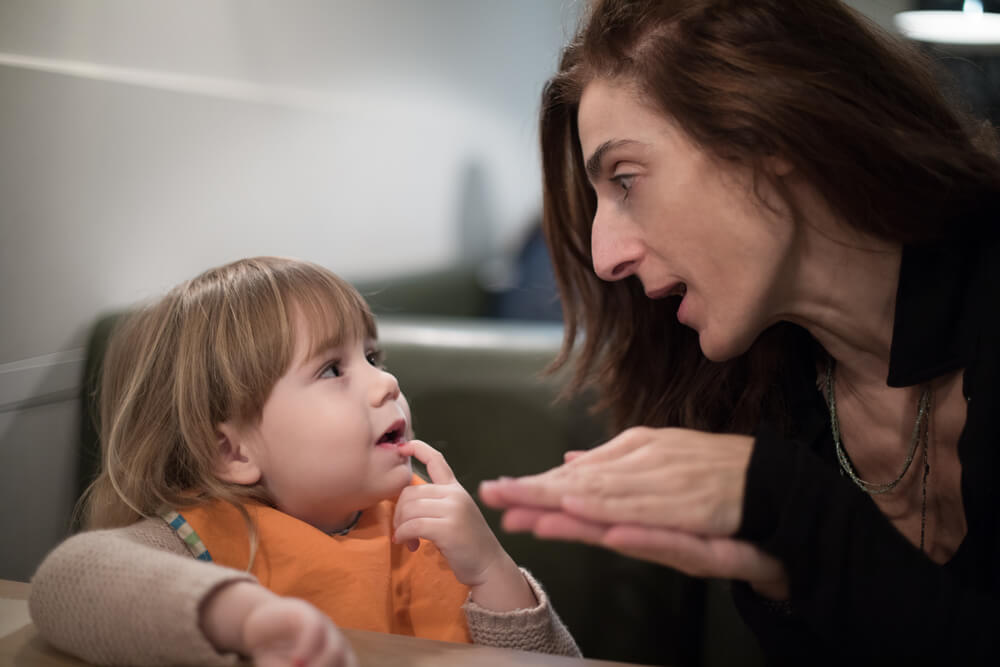
Quintanilla/Shutterstock.com
Babies usually start to form their first sentences around the age of 18 to 24 months. At this stage, they might string together two to three words to express an idea, such as “want milk” or “go park.”
By the time they reach 2 to 3 years old, their sentence construction improves, allowing them to use simple three-word sentences like “me want cookie.” As they grow older, their sentences become more complex.
By ages 3 to 4, they often use compounds and complex sentences, enhancing their ability to communicate more effectively. This progression in sentence construction marks an exciting phase in your child’s speech development.
Baby Speech Development Milestones
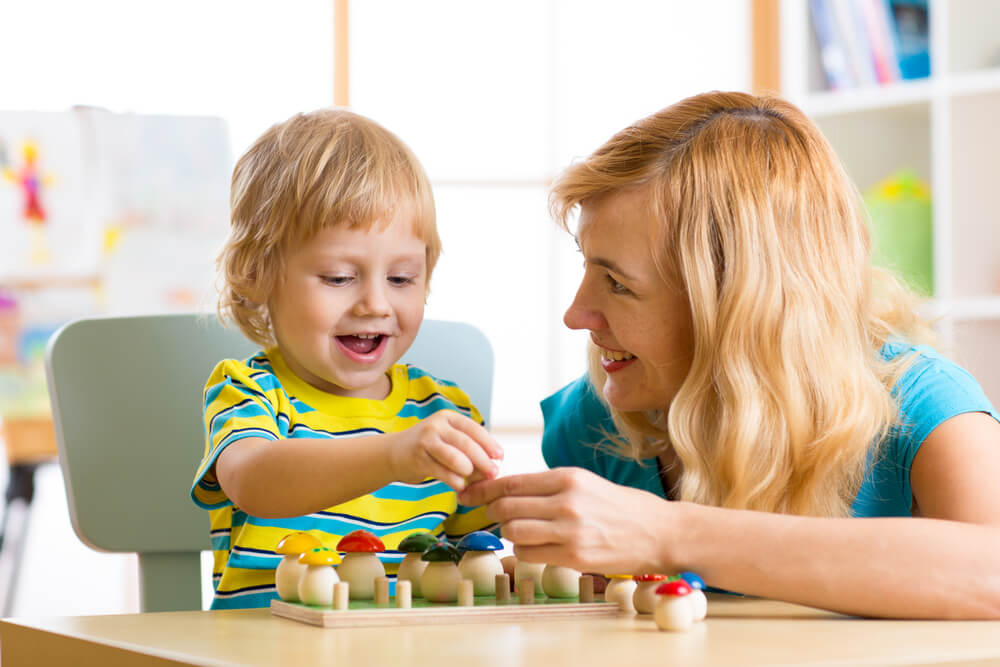
Oksana Kuzmina/Shutterstock.com
Babies reach several exciting milestones on their journey to becoming chatterboxes. Every baby is unique, but there are some common ages where certain speech and language skills typically develop.
- Birth to 5 Months. In these early months, your baby will start vocalizing through coos and gurgles. They express pleasure and displeasure with different sounds and often become quiet when they hear a familiar voice. They might also start to make noises in response to being talked to, laying the groundwork for future conversations.
- 6 to 11 Months. During this period, you’ll notice your baby starting to understand simple concepts like “no-no.” They’ll begin babbling with more varied sounds and intonations, often creating strings of consonant-vowel combinations like “ba-ba” or “da-da.” Although “mama” and “dada” might make an appearance, it’s usually without specific meaning at this stage. Your baby may try to repeat sounds they hear, which is an important step in learning to speak.
- 12 to 17 Months. Your little one starts to connect words to meanings. They might say 2 to 3 simple words and can answer simple questions nonverbally, like pointing to a dog when asked, “Where’s the dog?” They also try to imitate simple words and sounds, which helps build their vocabulary.
- 18 to 23 Months. At this age, your baby’s vocabulary expands to around 50 words. They may begin to use 2-word phrases like “more milk” and enjoy making animal sounds. This is also when they start using pronouns and descriptive words.
- 2 to 3 Years. Your toddler is now forming 3-word sentences and can use more pronouns, plurals, and regular past tense verbs. They begin to understand spatial concepts and can identify various objects and colors. Conversations become more interactive, although they might still struggle with pronouncing longer, complex words.
- 3 to 4 Years. Speech becomes mostly understandable as they start grouping objects, identifying colors, and using most speech sounds. They can describe the use of objects, express ideas and feelings, and answer simple questions. Your child will enjoy poems and rhymes, confidently using verbs ending in -ing.
- 4 to 5 Years. By now, children are well on their way to becoming little conversationalists. They can engage in conversations, understand and use complex sentences, and their speech is clear, although occasional mistakes with complex words are normal. They love repeating sentences and enjoy playing with language in new ways.
Read also: 6 Stages of Language Development in Kids (Plus FAQS!)
What Factors Affect Your Baby’s Ability to Talk?
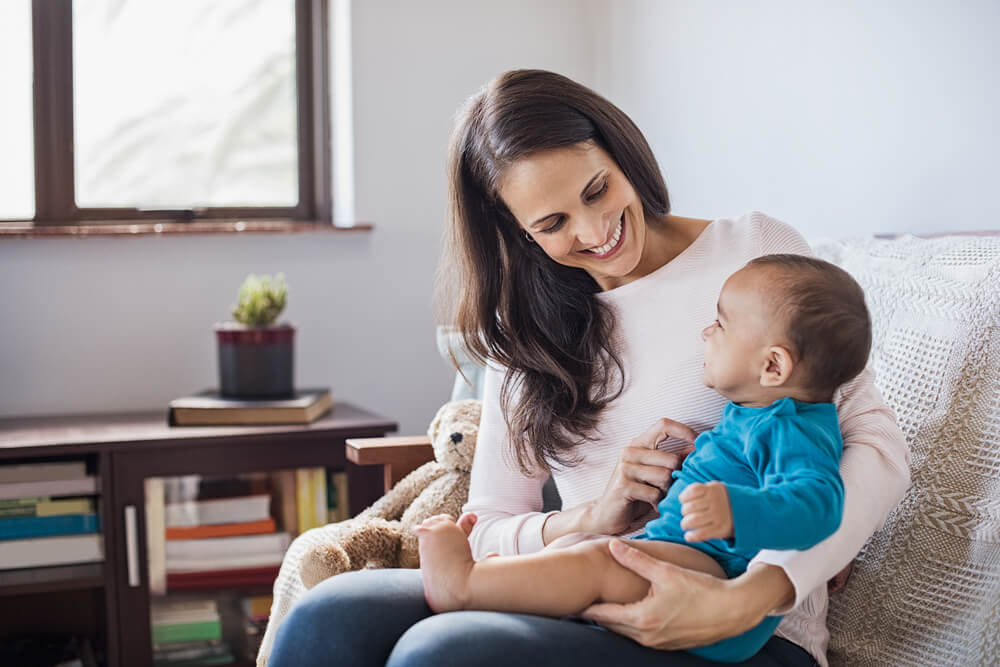
Ground Picture/Shutterstock.com
Several factors can influence your baby’s ability to talk.
Genetics
Genetics play a crucial role, as parents with a history of speech delays may pass these traits down. Understanding potential genetic factors can help you and your pediatrician create a proactive plan for monitoring and supporting your baby’s speech development.
Language Exposure
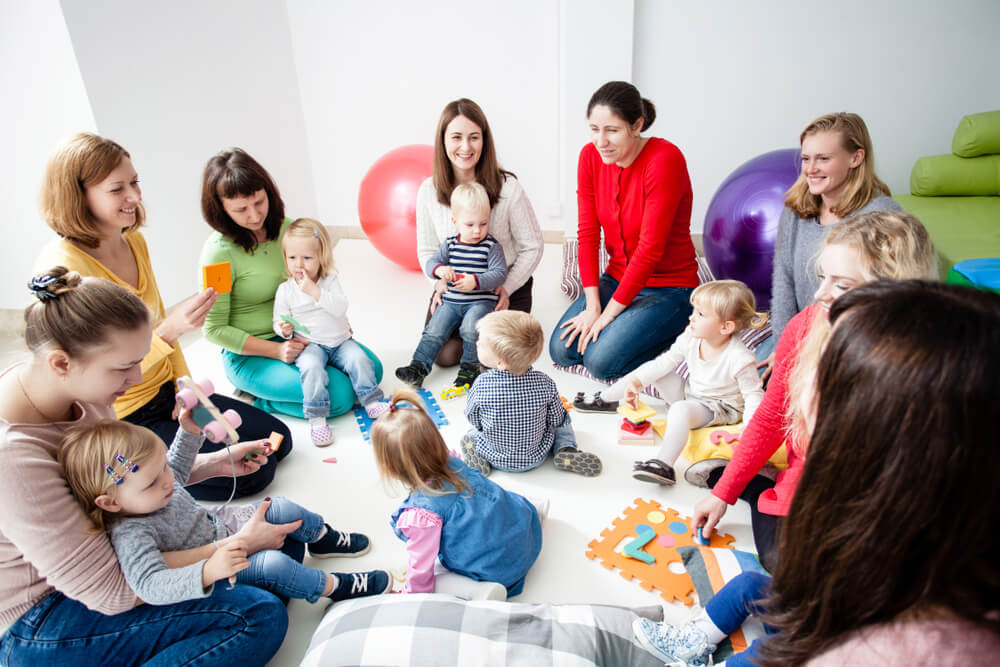
Oksana Shufrych/Shutterstock.com
Exposure to language is also vital; babies who hear more words and conversations around them typically start talking earlier. By hearing words and engaging in conversations, babies start to understand the sounds and patterns of speech.
Think of it as a sponge soaking up water. The more language your baby is exposed to, the more they absorb. This exposure helps them to learn new words, understand grammar, and eventually, form their own sentences.
Every bit of language they hear contributes to their understanding and encourages them to try speaking themselves. So, don’t worry about perfect sentences or pronunciation; the goal is for your baby to hear lots of words and have fun learning!
The quality of interactions matters, too. Engaging with your baby through reading, singing, and talking can stimulate their speech development.
Hearing Impairments
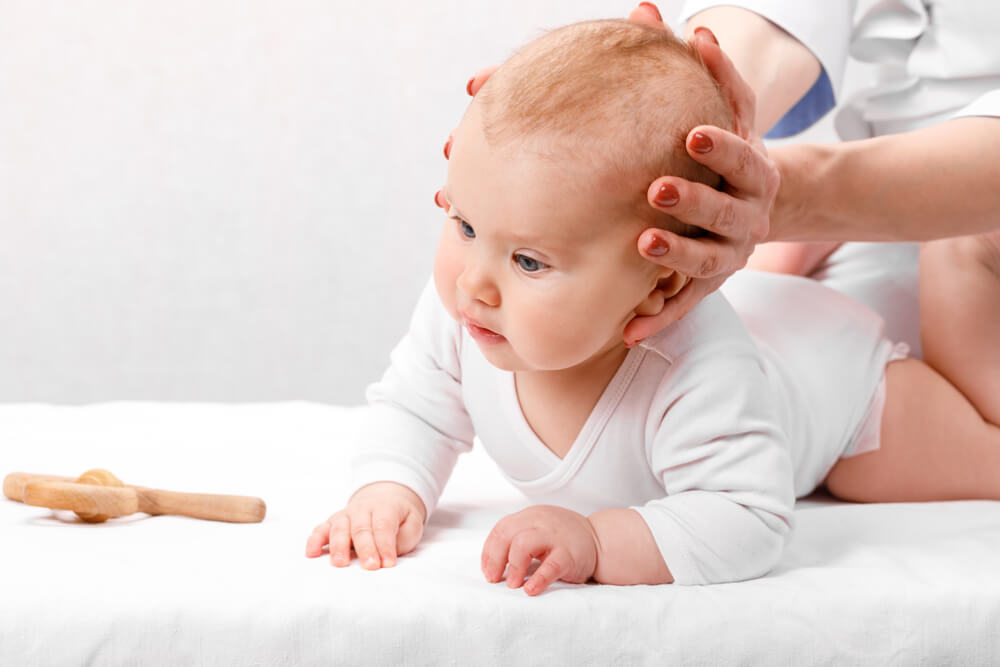
Dmitry Naumov/Shutterstock.com
Hearing ability affects speech; babies who have hearing issues may encounter delays. For instance, if your baby has trouble hearing, it can lead to significant delays in learning to talk and understand language.
Hearing is crucial because it allows babies to pick up the sounds and rhythms of speech that they need for their own development. Babies with hearing impairments may not hear their parents’ words clearly enough to imitate them.
When a baby doesn’t hear well, it might miss out on the essential early babbling stage or the opportunity to react to simple verbal cues. This can impact its vocabulary growth and its ability to form sentences later on.
It’s important to monitor your baby’s responses to sounds from birth. Notice if they startle at loud noises or turn their head towards voices. Consistent monitoring can help to catch any hearing issues early, ensuring your baby gets the support they need for healthy speech development.
Autism Spectrum Disorder or Cognitive Impairments
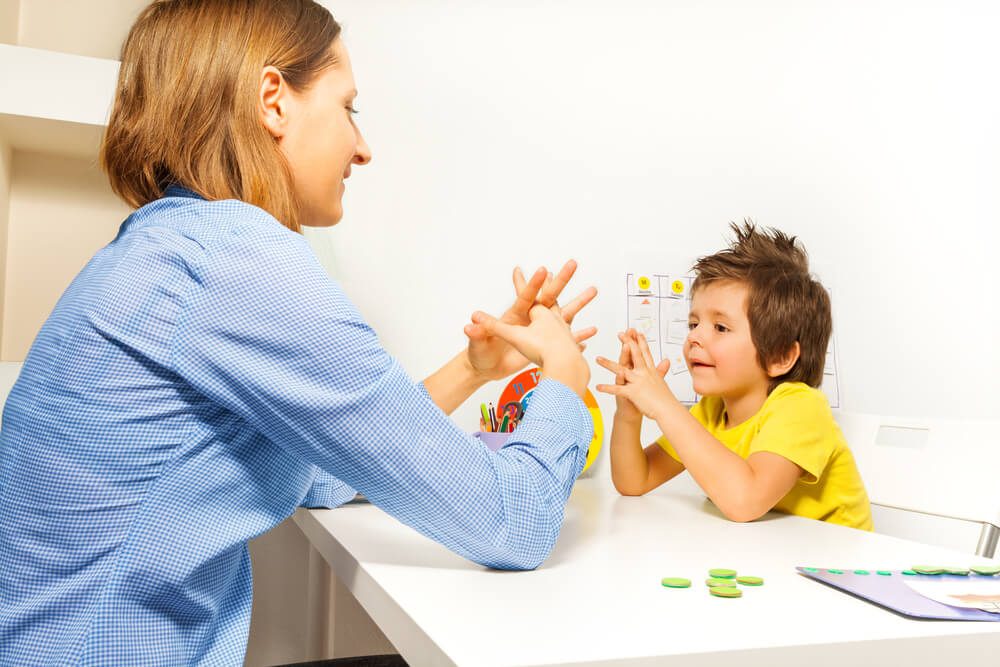
Sergey Novikov/Shutterstock.com
Conditions such as Autism Spectrum Disorder or cognitive impairments can impact speech progress.
Babies with Autism Spectrum Disorder (ASD) may experience delays in speech development. They often show less interest in social interactions, which can hinder verbal communication.
They might also have difficulty understanding and using nonverbal cues such as gestures and facial expressions. This can make it challenging for them to pick up language naturally through social engagement and imitation, crucial components of early speech development.
Cognitive impairments can also affect a baby’s ability to talk. These impairments may slow the development of understanding language and learning to form words and sentences.
Babies with cognitive impairments might take longer to reach speech milestones, such as babbling, saying their first words, or forming simple sentences. Early intervention and speech therapy can be vital in helping these children improve their communication skills.
Down Syndrome, a genetic disorder, typically causes delays in speech and language development due to factors like low muscle tone affecting speech production and cognitive delays impacting language acquisition.
How to Teach Your Baby to Talk
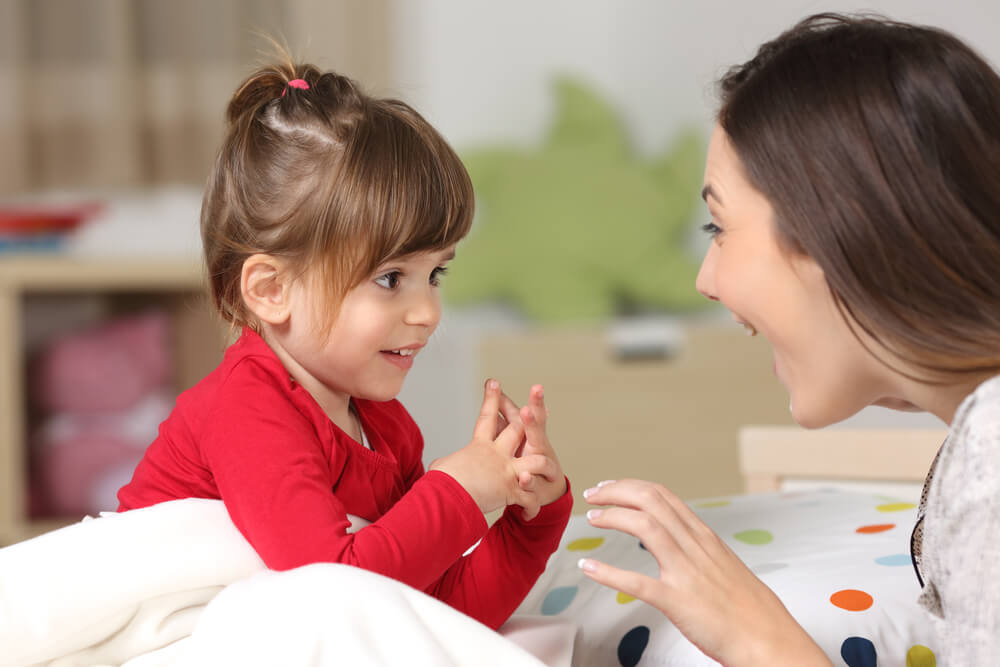
Antonio Guillem/Shutterstock.com
Teaching and encouraging your baby to talk can be an exciting and rewarding journey.
- Start by talking to your baby frequently, even if they don’t understand the words yet. Narrate your activities and describe what you see around you.
- Reading to your baby is a fantastic activity. Choose colorful board books with simple stories and lots of pictures. Point to the images and name them. This can help your baby connect words with objects. Repetition is key, so don’t be afraid to read the same book multiple times.
- Another great approach is to engage in interactive play. Sing songs, play peek-a-boo, and make funny faces to prompt a response.
- Imitate the sounds your baby makes and add new words to their babbling. For example, if your baby says “ba,” you can say “ball” or “baby.”
- An activity you might enjoy is a “narrate your day.” Talk to your baby about what you are doing as you go about your daily tasks. For instance, “Mommy is washing the dishes now. Look at the bubbles!” This running commentary helps your baby hear more words throughout the day.
- Don’t forget about naming games. While playing with toys, you can ask, “Where is the teddy bear?” and then point to it. Once your baby begins to grasp this game, they might start pointing, too.
- Another effective technique is to use a “talking show-and-tell.” When you hand your baby something, name it clearly. “Here is your cup. Your blue cup. Let’s drink some water from the cup.” This helps in building vocabulary.
- Incorporate music and movement. Sing nursery rhymes and do the actions together. Songs with repetitive phrases and easy melodies are particularly helpful for language learning.
- Even a simple game of “pat-a-cake” can be turned into a speech activity, as it encourages your baby to mimic words and actions.
Be patient and positive. Celebrate their attempts to communicate and avoid rushing their progress. Every baby is different, and consistent encouragement will support them in developing their speech skills at their own pace.
Related: Guide to Baby’s First Steps: When Do Babies Start Walking?
Signs and Causes of a Speech Delay

New Africa/Shutterstock.com
Being aware of the signs of a speech delay in your baby can help you identify if they might need extra support. By around 12 to 18 months, most babies are starting to say a few words and can understand simple instructions.
If your baby isn’t making sounds, babbling, or trying to communicate by 12 months, it could be a sign of a delay. Similarly, by 24 months, babies typically should be able to say at least 50 words and combine them into simple two-word phrases. If your little one isn’t meeting these milestones, it’s worth taking note.
Several factors could contribute to a speech delay in babies:
- Hearing problems can play a significant role, as babies learn to talk by listening to those around them. Chronic ear infections might affect hearing and, subsequently, speech development.
- Additionally, developmental disorders such as Autism Spectrum Disorder (ASD) or other neurological conditions might also cause speech delays.
- Environmental factors, like limited exposure to language or a lack of verbal interaction from caregivers, can also impede speech development.
It’s important to remember that every child develops at their own pace, but if you’re concerned about your baby’s speech development, it’s always a good idea to consult with a pediatrician or a speech-language pathologist. Early intervention can make a significant difference.
What Are Signs Your Child May Need Help with Speech and Language Development?
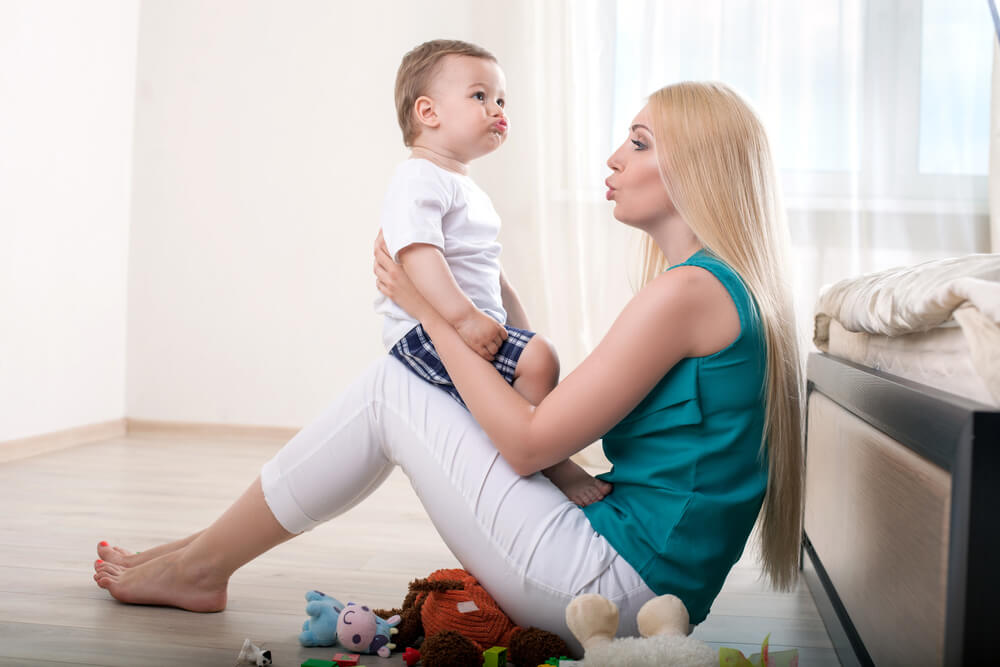
Olena Yakobchuk/Shutterstock.com
Watching your baby grow and develop their language skills is exciting, but sometimes, you might notice that things aren’t progressing as expected.
Look out for red flags that may indicate a need for professional help. If your child isn’t babbling by 12 months, struggles to make eye contact, or shows no interest in social interactions, these could be early signs. Between 18 to 24 months, if your child has a limited vocabulary (fewer than 50 words) or cannot form simple two-word phrases, it might be time to consult a specialist.
If at any age your child seems to understand very little of what is being said or has difficulty imitating sounds and words, these are important cues to seek professional advice.
If you’re concerned about your baby’s speech and language development, the first step is to consult with your pediatrician. They can perform initial assessments and recommend the next steps.
One common referral is to a speech-language pathologist (SLP). These specialists are trained to assess and treat various speech and language issues in children. Through personalized therapy sessions, they can help improve your child’s communication skills.
Early intervention programs offer comprehensive services for young children with developmental delays. These programs provide speech therapy, along with other forms of developmental support, in a coordinated manner.
Don’t forget to involve your child’s caregiver or daycare provider. They can offer insights and observations that may be valuable for any professionals involved in your child’s care.
Finally, parent workshops and support groups can provide practical tips and emotional support. Remember, early action is key to helping your child reach their full potential.
When Should a Baby Start Talking?
Babies should start talking or making babble sounds around six months old. But they will begin forming words when they are around one year old. Every baby develops at a different pace and some factors may lead to speech delays.
It’s important to gauge your baby’s speech and language development to notice if there are delays and get the attention your baby needs early on.
If you found this article helpful and informative about when babies start talking and how you can help them develop strong language and speech abilities, share this with other new parents to help them as well.
FAQs

Foxy burrow/Shutterstock.com
What is the earliest a baby can talk?
The earliest a baby can talk is around 12 months. They can form simple words and maybe string together a couple to communicate their thoughts and needs.
How many words should a one-year-old say?
A one-year-old baby should be able to say around five words. By 18 months, they will be using around 50 words.
What is the average age babies start talking?
On average, babies will start talking in a string of three or four words around two years old.
Is it normal for a 2 year old not talking?
It is not developmentally normal for a two-year-old not to be talking. If this is the case, seek advice from your pediatrician.
The picture on the front page: Prostock-studio/Shutterstock.com
Проверьте электронный ящик















